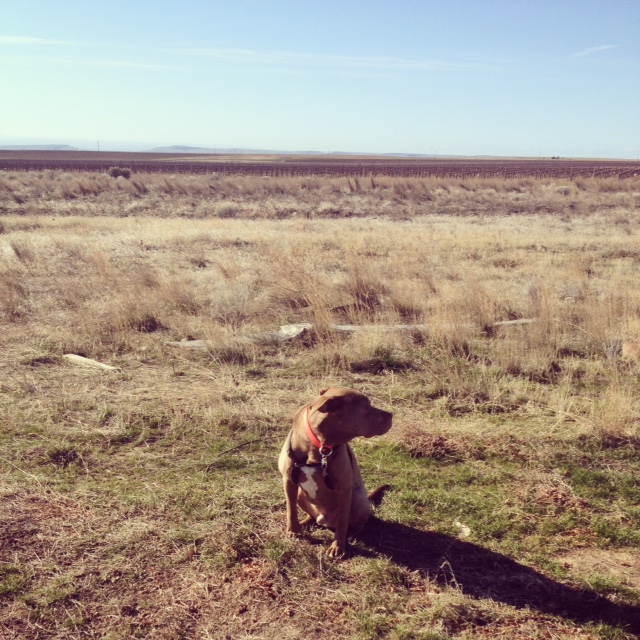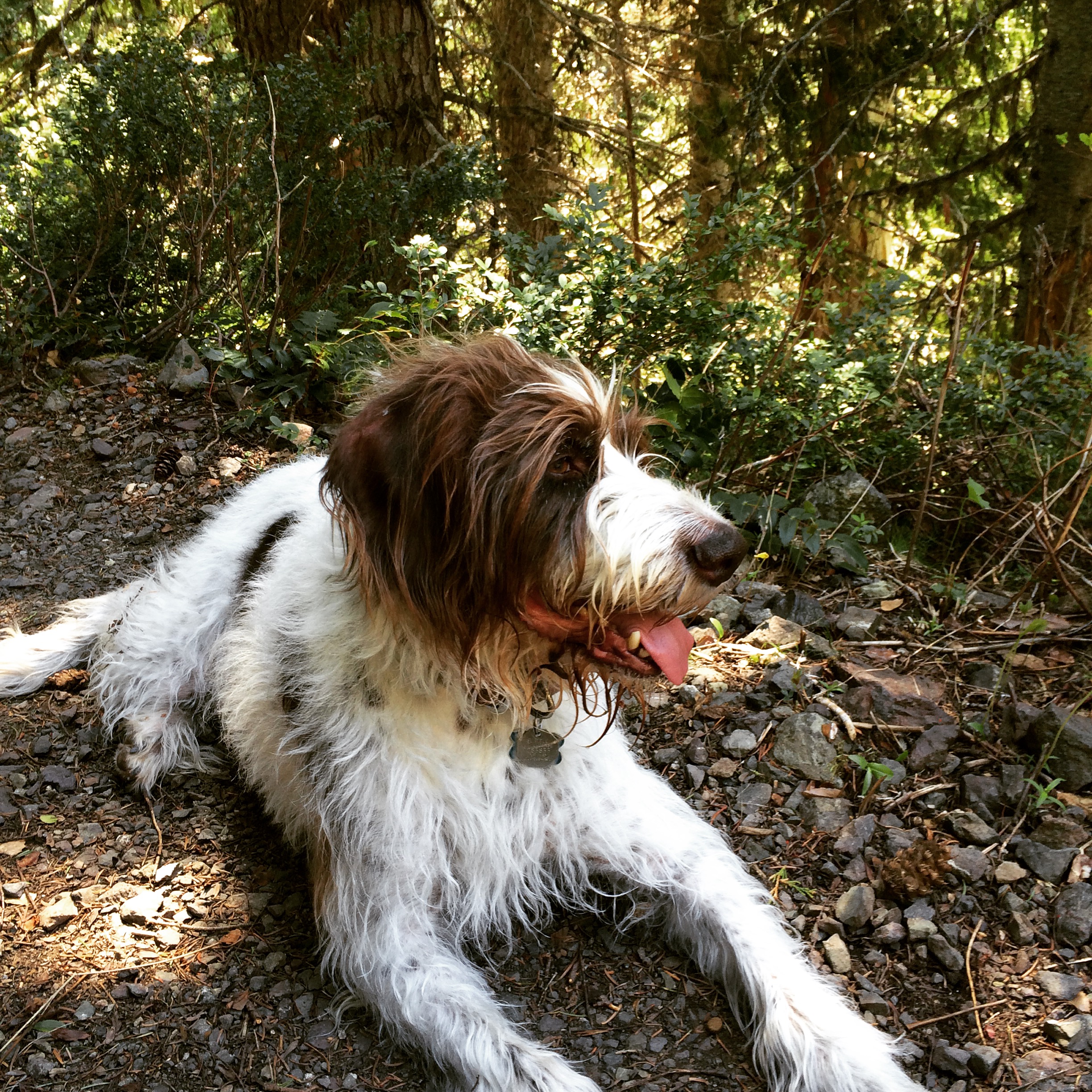After a day of back-to-back-to-back planning meetings, 12 hours of checking monitoring wells in pouring rain, driving 200 miles to and from a project site, or cranking out the last section of a 100-page report, Aspect staffers are often in need of a friendly face. Luckily, we are backed by a devoted group of canine consultants that advise us on all things comforting, charming, and cute. Our four-legged friends are fuzzy therapy in the field, office, and at home. Below are stories of some of the dogs, both living and living on in our memories, who never fail to put a smile on our faces.
FRODO
There is hardly a day you will find me at the office without Frodo, who has been coming with me to work since we rescued him at five weeks old in January 2015, and essentially grew up in the Bainbridge office. On the rare occasion that I walk into the office without him, I often get bombarded with concerned people wondering what’s wrong, where he is, and why he’s not with me. Thanks to Frodo, my office is often a pit stop for people on their way to get lunch, grab a piece of candy, or simply when they need a little stress reliever or a smile. Even when things get a little stressful in my corner of the office, it’s nothing a short walk or potty break outside with him can’t fix. In addition to that he has helped me form relationships with a lot of Aspect employees I am now lucky enough to call my friends. Maybe I’m biased, but Frodo feels like such a part of the Bainbridge office I honestly can’t imagine the day without him!
- Meghan Lawson Project Assistant
STELLA
Stella is a good companion and always enjoys keeping me company. When I see her lying about, she always reminds me to stay relaxed.
- Eric Marhofer, Senior Remediation Engineer
CARBON
Carbon doesn’t spend much time in the Wenatchee office – mostly because she’s a fieldwork dog! The Wenatchee office typically has to cover a lot of ground every week so Carbon and I do a lot of traveling together to serve the greater Central and Eastern Washington areas. Sometimes, Carbon just comes along to keep me company during overnight sampling adventures or on routine maintenance trips to far reaching weather stations. Other times, she bounces along in the pickup bed and waits patiently as I inspect various bits of infrastructure on a local farm or orchard. Wenatchee is a small town and Carbon has been my most surprising means to building strong client relationships. I’ve accidentally been introduced to more than one client through Carbon befriending their dogs at the dog park or through a local sheep herding event. Now I just have to teach her to start writing reports!
- Taylor Dayton, Staff Water Resources Engineer
BANJO
Banjoboy isn’t a big fan of the office. Too much work and not enough cuddles. He’s much happier out in Horse Heaven Hills. He likes guarding the driver’s seat while I run a pumping test. It’s an exhausting job, but somebody’s gotta do it.
- Aaron Pruitt, Project Hydrogeologist
KASSI
My first baby, Kassi dog passed away recently at 14 ½ years old. My husband, JB, and I picked her up from an animal shelter in Shelton, WA in April 2002. As the runt of her litter, she had escaped and was picked up wondering the streets. Kassi was a tough little runt, but had separation anxiety. We learned pretty quickly that we could not leave her at home as she destroyed everything: crates, carpet, flooring, and walls. She was trying to get out and be with her pack, not destroy just because she was mad. So began the take your dog everywhere routine. Luckily, she enjoyed being in the car and never damaged it. Kassi enjoyed going to construction sites with me and Neah Bay with JB (photos attached). She was very smart and brought us loads of happiness. Seeing a dog with their owner, always brings a smile to my face.
- Ali Dennison, Senior Project Geologist
AUGI
This is my dog Augie. He is a Corgi and Aussie Shepherd mix, known as an “Augi” mix. He runs a hard bargain negotiating for food from my daughter at her play table. Like most corgis he sleeps on his back like a human. He lives by the corgi mantra “I don’t always bark, but when I do its usually at nothing”. For that reason, he doesn’t come to the office.
- Nick Szot, Senior Project Geotechnical Engineer
HUNTER
In loving memory of Hunter, who we lost recently. This picture was taken just after a snuggle session with my youngest daughter.
- Eric Knoedler, Staff Hydrogeologist
COSMO
I've only brought Cosmo to work a couple of times maybe 7 or 8 years ago due to the travel logistics but it was really fun when I did because I could show him off. After all, he is the best dog in the world! Cosmo lives to go on adventures. We run in the Vashon forest every Saturday, whenever I can. He trained with me for a marathon and many other endurance events including distance swims. These days as he is slowing down, he likes to go fishing with me as shown on the attached pictures.
- Henry Haselton, Principal Geotechnical Engineer
BAMBOO
Bamboo, best supporting actor (faux service dog category). He hovers close to Lori just in case she might benefit from giving him a few pets.
- Doug Hillman, Principal Hydrogeologist
COOPER
I love bringing Cooper to work! Plus, Cooper loves coming to work as some of his favorite people work at Aspect…not to mention his fondness for cleaning up the crumbs from under people’s desks. Having a dog in the work place tends to bring down stress levels and gives you a great excuse to get up from your desk and take a walk outside.
- Kirsi Longley, Senior Project Environmental Scientist
MYKA & CADENCE
Office dogs help to provide a connection with my colleagues. My dogs encourage me to get up and walk away from my desk to get more face-to-face time with coworkers. Their silly antics also give a refreshing perspective (as you can see in the picture of Myka taking a crazy nap!) for not only me but my fellow coworkers. This has proven crucial on many occasions, most importantly when we have stressful and busy deadlines! Time with my dogs helps me keep perspective on work-life balance. I’m ever grateful for the opportunities that sharing my dogs with my colleagues has opened up for me. They’ve helped me find myself in conversations that lead to especially interesting and challenging project work, and keep folks coming back to me for collaboration.
- Robyn Pepin, GIS Analyst
TESLA
Tesla has only come in with me once so far, but I think she had a good time. She loves people and attention, and is the best lap warmer ever.
- Lea Beard, Senior Staff Data Scientist
HANK
Hank is the strangest and most loyal dog I’ve known. He’s somehow both fearless and completely neurotic, and an escape artist who is too smart for his own good. His favorite activities are clearly snuggling and tug of war, but he’s also been known to enjoy rock climbing, jumping fences, standing completely still and staring at the wall for long periods of time, and impersonating Chewbacca. All around, he’s a pretty awesome mutt!
- Seann McClure, Project Hydrogeologist
Ookii
He's a sweetheart to a fault. He's the only dog I know who shares his toys, treats, and even his food.
- Michael Totin, Network/Systems Administrator
PIPER
Piper is a 9-year-old German Wirehaired Pointer. She loves tennis balls, chasing squirrels, swimming, and being pet on the head. Sometimes she is lucky enough to come to the office with me, which is great for her because there are a lot of people who will pet her cute, shaggy head. I like having her in the office because she reminds me to get up from my desk every once in a while and take a walk. And because I get a lot more visitors to my office when she is here…everyone loves Piper!
- Carla Brock, Associate Geologist
MILES
Miles is part lab/part horse making him a tough fit for the office life. Combine that with the fact that my colleague always whips him into a frenzy and he doesn’t get to visit the office very much…but that’s okay, he has some fun two-legged buddies at home to keep him busy.
- Andrew Holmson, Senior Geotechnical Engineer
ARTIE
Artie is a yellow lab with a characteristically friendly disposition. He loves going outside and is a great rock climbing partner with his impressive ability to scale steep surfaces. Although he generally wants to be friends with everyone, he has a hilarious fear of small dogs andcats.
- Bracken Capen, Senior Staff Engineer








































